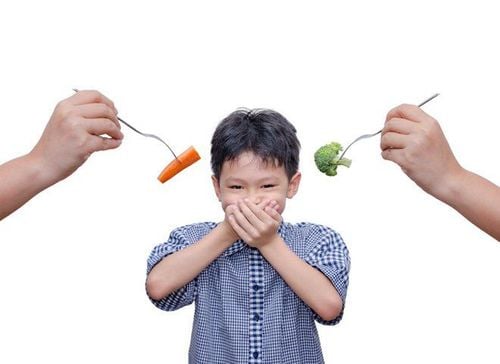This is an automatically translated article.
Children 2 - 5 years old may still be small, but the rate of development is ongoing. Therefore, children always need to receive nutrients from a varied and balanced diet. There are many reasons why a 3-year-old child does not gain weight, so finding out the reasons why a child does not gain weight will help parents adjust the daily menu for their child more appropriately.
1. Signs that a 3-year-old child is not gaining weight
From the time the child is born until the age of 5, the child's weight and height for age readings are presented in the growth chart. In cases where the child has indicators that are not within the normal range, the child may be underweight or malnourished. However, if the child has a number of congenital diseases, has recently had an acute illness or has a history of premature birth or low birth weight, the child's condition may be accepted at a lower level than other children of the same age. litter if the growth curve remains upward.
On the contrary, if the child's growth curve is flat or the child is eating normally but not gaining weight, especially for several consecutive months, then this may become a matter of concern.
In addition, if a child's weight and height chart is not available, but parents measure their child's parameters themselves, to know if they have the right weight for age, height and gender, Parents can check themselves using the BMI reasonable weight calculator.
2. What causes a 3-year-old child not to gain weight?
There are many different factors that can affect a baby's development, including:
Not providing enough calories: Sometimes parents or caregivers do not mix formula or nutritional powder for babies properly, so the child is not getting enough calories. Difficulty feeding a baby can also prevent a child from getting enough energy to thrive. And sometimes parents miss their child's hunger cues. Children eat too little: Children eat less is one of the reasons why children do not gain weight. This could be due to a developmental delay, a picky eater, a medical condition that affects swallowing such as a birth defect, or autism, in which the child does not like eating foods with certain textures or tastes. . Diseases of the digestive system: Functional or structural damage to the digestive system can prevent a 3-year-old child from gaining weight. Conditions such as gastroesophageal reflux disease, chronic diarrhea, cystic fibrosis, chronic liver disease, and celiac disease can make it difficult for children to absorb the nutrients and calories they need to gain weight. Food intolerance: This condition means that the body is sensitive to certain foods. For example, a milk protein intolerance means that the body cannot absorb foods like yogurt and cheese, which can lead to the child's body not growing to its full potential. Infection: The body uses more calories to build resistance against infection. Meanwhile, children feel tired, anorexic and may eat less than usual. In addition to the common causes of children not gaining weight above, there are many other potential causes that require a doctor's visit and specialized tests to identify.

Trẻ 3 tuổi không tăng cân có thể do trẻ ăn quá ít
3. Diet for 3-year-olds helps to gain weight
All children need energy and nutrients from a varied and balanced diet. Accordingly, a healthy diet for young children is not the same as for adults. Many of the "healthier alternatives" that adults are advised to eat are not suitable for toddlers and children as young as 3 years old.
Because children have smaller stomachs than adults and need to eat smaller amounts more often, they should be fed 3 meals a day plus 3 snacks at alternating times. For 3-year-olds who are not gaining weight, they may be able to increase the number of meals with higher-calorie foods. Specifically, a 3-year-old child can start eating the same diet as the rest of the family, including:
Main meals based on high carbohydrate, starchy foods such as potatoes, bread, rice and pasta. There are different fruits and vegetables every day. Give your child milk or milk alternatives (such as soy drinks and yogurt), and choose whole-cream but low-sugar options for children who are slow to gain weight. Choose some beans, fish, eggs, meat, or other proteins; Introduce your child to two servings of fish a week, with one serving of oily fish, such as salmon or mackerel. Use unsaturated oils to prepare baby food or spread it raw in small amounts. Remind your child to drink plenty of water during the day.
4. Foods to be careful when putting in your child's diet
Sugary drinks and foods are foods to avoid for children to consume in excess. When sugar comes into contact with children's teeth often and for a long time, their baby teeth will be prone to decay. Moreover, eating too many sweets will make children feel full faster and consume less main meals, which contain more essential nutrients.
Saturated fats are unhealthy fats, such as those found in burgers, hot dogs, pies, cookies, cakes, and cheeses. Try not to give these foods to your child often to avoid gas and bloating, and help children eat more delicious meals.
Whole grain foods - including foods like whole-wheat pasta, bread and brown rice - are inherently high in fiber and can make children feel full before they get enough calories and nutrients necessary.

Đồ uống và thức ăn có đường là các loại thực phẩm cần tránh cho trẻ tiêu thụ quá nhiều
5. How should vitamin supplements be considered for children?
Health organizations always recommend that all children 6 months to 5 years old receive vitamin A , C and D drops periodically. This is especially important for low birth weight children who are not getting enough of a varied diet to provide all the nutrients they need.
Besides, there are many types of multivitamins on the market that are introduced as providing essential substances to feed malnourished children, picky eaters. Indeed, the role of micronutrients helps to stimulate the energy metabolism of cells, thereby indirectly helping children eat better.
However, symptom improvement can take place for a long time, so it is recommended that parents be calm and persistent when supplementing with nutrients for their baby, even through eating or functional foods. In particular, the use of functional foods should choose those of natural origin that are easily absorbed, do not allow simultaneous use of many types or continuously change the types of functional foods.
Moreover, before using for children, parents should consult a doctor and absolutely abuse or depend on these products, both containing the risk of poisoning due to an excess of trace substances, and forfeit the child's opportunity to enjoy the taste buds.
6. How to increase calories in meals for children who do not gain weight?
There are several things parents can do to increase their child's calorie intake until they reach a healthy weight, while still providing a healthy diet:
Feed your child mashed potatoes with extra milk or cheese Spread grated cheese on toast Offer your child milk pudding for dessert Drink soup or milk in place of water Have energy-rich snacks ready when your child is hungry Build yourself a healthy attitude to foods for children to observe and learn Early introduction of a variety of foods and tastes Praise a lot when a child eats a new food and ignore negative reactions to it. Be patient - some babies need to be introduced to new foods several times before they actually eat them. Don't beg your child to eat everything on the plate or criticize them when they don't eat as much as they would like. This turns mealtime into a negative experience for the child. Even if your child is not gaining weight or is underweight, he or she should always be encouraged to be physically active to increase absorption of new energy. In summary, if parents persist in providing a healthy diet according to the guidelines above and advice from a pediatrician, nutritionist, weight and growth of a 3-year-old child who is not gaining weight. will be improved rapidly.
In the case of children with malabsorption and growth retardation, parents should supplement their children with supportive products containing lysine, essential micro-minerals and vitamins such as zinc, chromium, selenium, and B vitamins to help fully meet their needs. nutritional needs in children. At the same time, these essential vitamins also support digestion, enhance nutrient absorption, help improve anorexia, and help children eat well. Parents can simultaneously apply dietary supplements and functional foods derived from nature for easy absorption. The most important thing is that improving your baby's symptoms often takes a long time. Combining many types of functional foods at the same time or changing many types in a short time can make the baby's digestive system unable to adapt and completely not good. Therefore, parents must be really patient with their children and regularly visit the website vimec.com to update useful baby care information.













